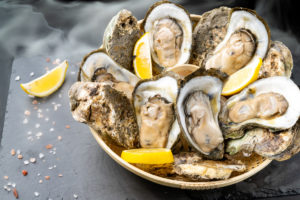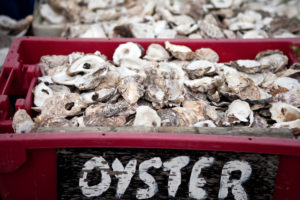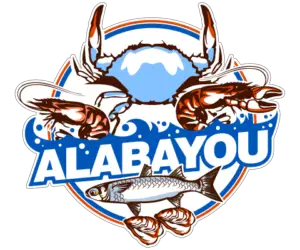Growing up on my grandfather’s shrimp dock in Bayou La Batre, Alabama, I have witnessed the profound impact of oysters on our Gulf Coast community.
I often get asked what do oysters eat? Oysters primarily feed on phytoplankton and small particles in the water, such as algae and organic detritus. Their diet consists of microscopic organisms that they filter from the surrounding water.
With a family legacy spanning over a century in the seafood industry, I understand the vital role oysters play in our environment and the importance of preserving this cherished tradition.
In this comprehensive exploration, we’ll delve into what oysters eat, their ecological significance, and their remarkable nutritional journey.

Oysters: Gulf Coast Guardians
Oysters, known as the “filters of the sea,” are vital to maintaining the health of our coastal waters.
These bivalve mollusks feed on microscopic algae, detritus, and other organic matter suspended in the water.
As they consume these particles, they help clarify the water and improve its quality.
In fact, a single oyster can filter up to 50 gallons of water per day.
Dive into the captivating realm of oysters like never before with ‘Oysters: A Celebration in the Raw.’ Discover enchanting tales and concealed oceanic flavors.
What Do Oysters Eat?
Oysters are opportunistic filter-feeders, meaning they consume whatever microscopic organisms are present in their environment.
Their diet primarily consists of phytoplankton (microscopic algae), zooplankton (tiny aquatic animals), and organic detritus.
Oysters draw water into their gills, where they extract and ingest these tiny organisms, leaving behind cleaner, clearer water.

Oysters and Environmental Impact
Beyond their filtration prowess, oysters have a far-reaching impact on coastal ecosystems.
By removing excess nutrients and algae from the water, they help prevent harmful algal blooms and maintain a balanced ecosystem.
Oyster reefs also provide habitat and shelter for various marine species, fostering biodiversity along our coastlines.
5 reasons why oysters are amazing
Oysters stand out as an exceptional choice for both your palate and the planet. Here are five compelling reasons why oysters are the best:
- Natural Water Filtration: Oysters are nature’s water purifiers, filtering up to 50 gallons of water per day. Their filtration prowess improves water quality and helps combat nutrient pollution in aquatic ecosystems.
- Habitat Enhancement: Oyster reefs provide shelter and habitat for numerous marine species, contributing to biodiversity and supporting coastal ecosystems.
- Low Environmental Impact: Oyster farming has a relatively low environmental footprint compared to other forms of aquaculture, making it an eco-friendly seafood choice.
- Nutrient-Rich: Oysters are packed with essential nutrients like zinc, iron, and vitamin B12, making them a nutritious addition to your diet.
- Sustainable Seafood: Many oyster farms adhere to sustainable practices, ensuring a responsible source of seafood that doesn’t harm the environment.

The Gulf Coast Tradition
For generations, Gulf Coast communities have relied on oysters as a staple of their diet and culture.
Oyster roasts, festivals, and family gatherings have celebrated this cherished tradition.
Preserving the health of oyster populations and their habitats is not only essential for our environment but also for safeguarding the cultural heritage of our Gulf Coast.
Take a leap into our latest blog post and unlock the secrets to achieving crispy perfection while frying oysters.
Embark on a culinary adventure that will have your taste buds clamoring for more
Oysters’ Nutritional Journey
Oysters are not only ecological heroes but also a nutritional powerhouse.
They are a rich source of essential nutrients, including protein, vitamins, and minerals.
Just a few oysters provide a substantial portion of your daily recommended intake of zinc, iron, and vitamin B12.
Their low-calorie content makes them a guilt-free addition to your diet.
5 Reasons to Eat Oysters
- Nutritional Powerhouse: Oysters are rich in essential nutrients like zinc, iron, and vitamin B12, making them a nutritious addition to your diet.
- Delicate Flavor Profile: Oysters offer a unique taste experience with their briny, sweet, and umami flavors that captivate the palate.
- Sustainability: Oyster farming often adheres to sustainable practices, ensuring a responsible source of seafood that supports healthy oceans.
- Culinary Versatility: Oysters can be enjoyed in various ways, from raw on the half shell to grilled, fried, or used in diverse recipes like seafood stews and chowders.
- Environmental Guardians: Oysters play a vital role in marine ecosystems by filtering water, enhancing habitat, and promoting biodiversity, contributing to healthier coastal environments.
Explore the captivating world of oysters and uncover 10 compelling reasons to indulge in these oceanic delights

The Future of Oysters
As we reflect on the ecological importance and cultural significance of oysters on the Gulf Coast, it becomes evident that their preservation is paramount.
Sustainable harvesting practices and efforts to restore oyster reefs are crucial for ensuring a thriving future for these remarkable bivalves.
Oysters are not merely mollusks; they are the guardians of our coastal waters, the bearers of tradition, and a source of nourishment.
Understanding what oysters eat and their pivotal role in our environment reinforces the need to protect and cherish this Gulf Coast heritage.
Let us embrace the legacy of oysters and work together to ensure they continue to thrive for generations to come.
